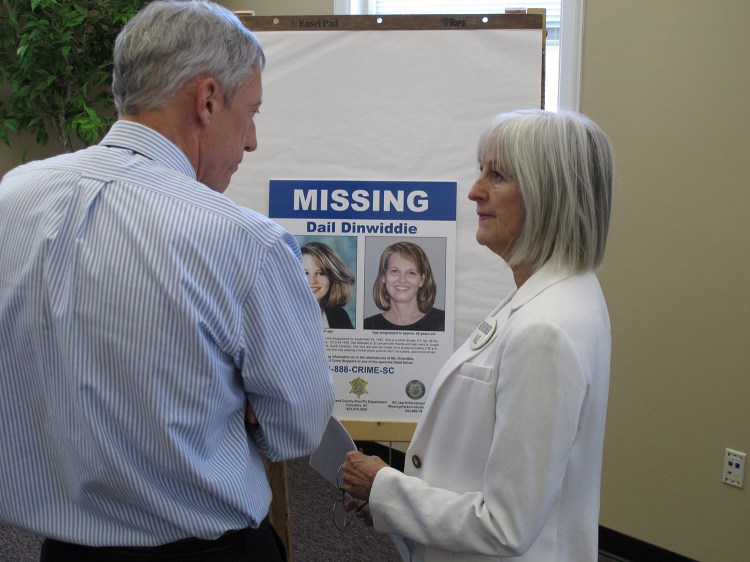Twenty-five years ago on Sept. 24, 1992, Dail Boxley Dinwiddie vanished.
Phffft. Just like that.
She was 23, a darling girl, anyone would say. Because even though she was, by age, a young woman, she was just 5 feet tall and weighed only about 100 pounds. She was a waif, an imp, a sweet spirit and an artist, who had come home after finishing college at Randolph-Macon to live with her parents, pursue graduate studies at the University of South Carolina – and, it turned out, to be my youngest son’s full-time babysitter.
Invariably, when I’d come home from work, I’d hear the tinkling sound of her laughter down the hall where she and John, then 8, were playing. The last time I saw her, she had brought John a miniature aquarium filled with sea monkeys.
The call from her mother, Jean Dinwiddie, came early in the morning. Dail hadn’t come home from a U2 concert the night before. Jean wanted to make sure I was at the bus stop where Dail met my son every day after school.
It took but a second for my eyes to begin burning. I knew in that instant that something terrible had happened because, above all, Dail was responsible and would never leave her little charge unattended. What we eventually learned was that after the concert, Dail and a group of friends had gone to the Five Points area of town where university students traditionally have kept the midnight oil burning. Dail was last seen about 1:30 a.m. by a bouncer at a now-defunct bar called Jungle Jim’s, when she left to go search for her friends.
Shortly after Jean’s call, I went to my office, which was located in a public relations firm run by Charles “Bud” Ferillo, a former Democratic officeholder and now the head of USC’s race and reconciliation program. I told Ferillo what had happened, whereupon he offered up his office, his phones and his staff. By afternoon, 20 or so high school and college volunteers had filled the hallways. Within hours, we had tacked up “Missing” posters all over town.
By week’s end, we had a building donated by a local law firm to use as a command center, Dail’s parents on “Good Morning America,” and posters in every state, thanks to a veteran Red Cross volunteer who strode into our new digs one morning carrying a bulging briefcase. Skipping formalities, he solemnly stated: “I need a desk, a map, and a telephone.”
Done.
Finally, someone who knew what he was doing. The rest of us were simultaneously paralyzed by shock and racing on adrenaline – working long hours, re-enacting the night Dail disappeared with her same group of friends, following each step while police investigators kept a close eye out for possible clues.
Our mission soon became a nonprofit organization called the Dail Dinwiddie Safe Streets Foundation, which was aimed at helping find any and all missing adults, as well as educating young people about personal safety.
Our board, of which I was president, included the executive director of South Carolina’s Adam Walsh Center, Margaret Frierson, our aforementioned Red Cross Guy, and other local leaders interested in helping find Dail but also in addressing a broader problem, which was that missing adults are typically on their own for 24 hours before police get involved. By then, the trail becomes cold and the missing person is less likely to be found.
Thus, we became sort of an on-call adjunct to the police department when an adult went missing, filling the 24-hour void with a public relations campaign, broadcasting the missing person’s name and face, and acting as intermediary between family and law enforcement.
Over the years, momentum waned. Volunteers graduated and migrated. Some, including our Red Cross guru, have died. A drawer in my office still contains Dail’s posters, bumper stickers and a few personal alarms we distributed to college students as part of a campus awareness project. In my brief experience as a quasi-detective, most of the missing turned up either dead or in jail.
As for Dail, who knows?
Someone.
Each time a wannabe perp comes forward to “confess,” hope dims a little. Each time somebody long missing is discovered, hope is rekindled. Someone out there can solve this mystery if he or she chooses. Someone has the power to release Dan and Jean Dinwiddie from a horrific nightmare that has consumed them for 25 years.
This is their fervent hope on this quarter-century mark. Please.
Kathleen Parker is a columnist for The Washington Post Writers Group. She can be contacted at:
Send questions/comments to the editors.



Success. Please wait for the page to reload. If the page does not reload within 5 seconds, please refresh the page.
Enter your email and password to access comments.
Hi, to comment on stories you must . This profile is in addition to your subscription and website login.
Already have a commenting profile? .
Invalid username/password.
Please check your email to confirm and complete your registration.
Only subscribers are eligible to post comments. Please subscribe or login first for digital access. Here’s why.
Use the form below to reset your password. When you've submitted your account email, we will send an email with a reset code.